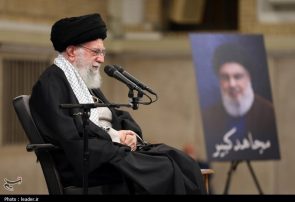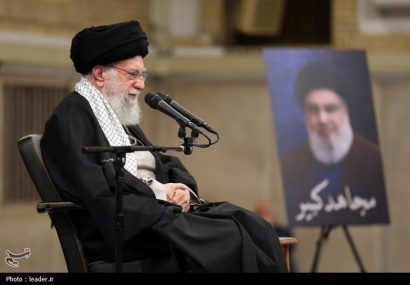TEHRAN (Iran News) A group of academic elites and outstanding scientific talents met with Ayatollah Khamenei at the Imam Khomeini Hussainiyah of Tehran on Wednesday, October 2.
The Leader initiated the meeting by speaking about the recent loss of Hezbollah’s Leader, Seyed Hassan Nasrallah, who was martyred in Beirut in an Israeli strike on September 27.
“We are in mourning these days. I, in particular, am deeply grieved. The loss of Mr. Seyed Hassan Nasrallah is not a small matter. Even though the atmosphere in the country is one of public mourning, I chose not to postpone this meeting with the elites, which had already been planned,” he stated.
Ayatollah Khamenei underlined the reason for holding the meeting of elites at the scheduled time, stating, “The message of this gathering is that even though we are in mourning, this does not mean that we should just sit in a corner and wallow in despair. Rather, our mourning is of the same nature as that of Imam Hussain (AS). It is reviving, propelling, and it inspires enthusiasm for work and progress.”
The Leader emphasized, “The root of the problem and the fundamental cause of conflicts and wars in the region lies is the presence of the United States and certain European countries that falsely advocate for peace and tranquility. If they leave this region, the conflicts and wars would come to an end, allowing the countries to manage their affairs and coexist in peace and prosperity.”
He considered Saddam Hussein’s instigation to attack Iran and the ensuing bitter and difficult days as an example of the warmongering of the United States and the West in the region. In the same context, Ayatollah Khamenei remarked, “The current friendship between the two countries, Iran and Iraq, of which the pinnacle is manifested in the great Arbaeen Walk, clearly demonstrates that the primary obstacle to peace in the region stems from those who falsely claim to seek it. We remain hopeful that, with God’s help, the determination of the Iranian people, the inspiration drawn from the Islamic Revolution, and collaboration with other nations, will, God willing, lead to the departure of our enemies from the region.”
The Leader addressed three issues relevant to the subject of the meeting: Recognizing gifted individuals in the country, preserving and multiplying these talents and the duties and responsibilities of the elite.
He regarded elite individuals and the conditions necessary for cultivating talent as among the country’s most valuable assets. Referring to the neglect of elite individuals and talent development during the reign of the Pahlavi regime, Ayatollah Khamenei emphasized that while the Revolution brought more attention to the capabilities of talented individuals, this focus needs to be intensified by involving them more actively in various sectors including water, oil, gas, nuclear energy, nanotechnology, and new sciences such as artificial intelligence.
The Leader highlighted the responsibilities of the country’s elites, stating, “The duties of the elites are more significant than those of the general populace, as they enjoy greater divine blessings and advantages, including knowledge, honor, and wealth.”
Highlighting the swift pace of scientific progress worldwide, the Leader urged intellectuals to embark in a jihad for a scientific uprising. The country, he remarked, needs a new scientific movement and leap, a responsibility that rests primarily on the shoulders of intellectuals. “Of course, scientific and research centers are also responsible in this regard, but the individual elite is the key factor.”
Ayatollah Khamenei also emphasized that a new scientific movement and leap would lead to superiority over rivals and ill-wishers. He highlighted that achieving scientific and technological superiority would significantly diminish the enemy’s capacity to harm the people of Gaza and Beirut’s Dahiyah district. This, he emphasized, would help avert provocations that would break the hearts of the people and the youth.
- source : tasnim






























